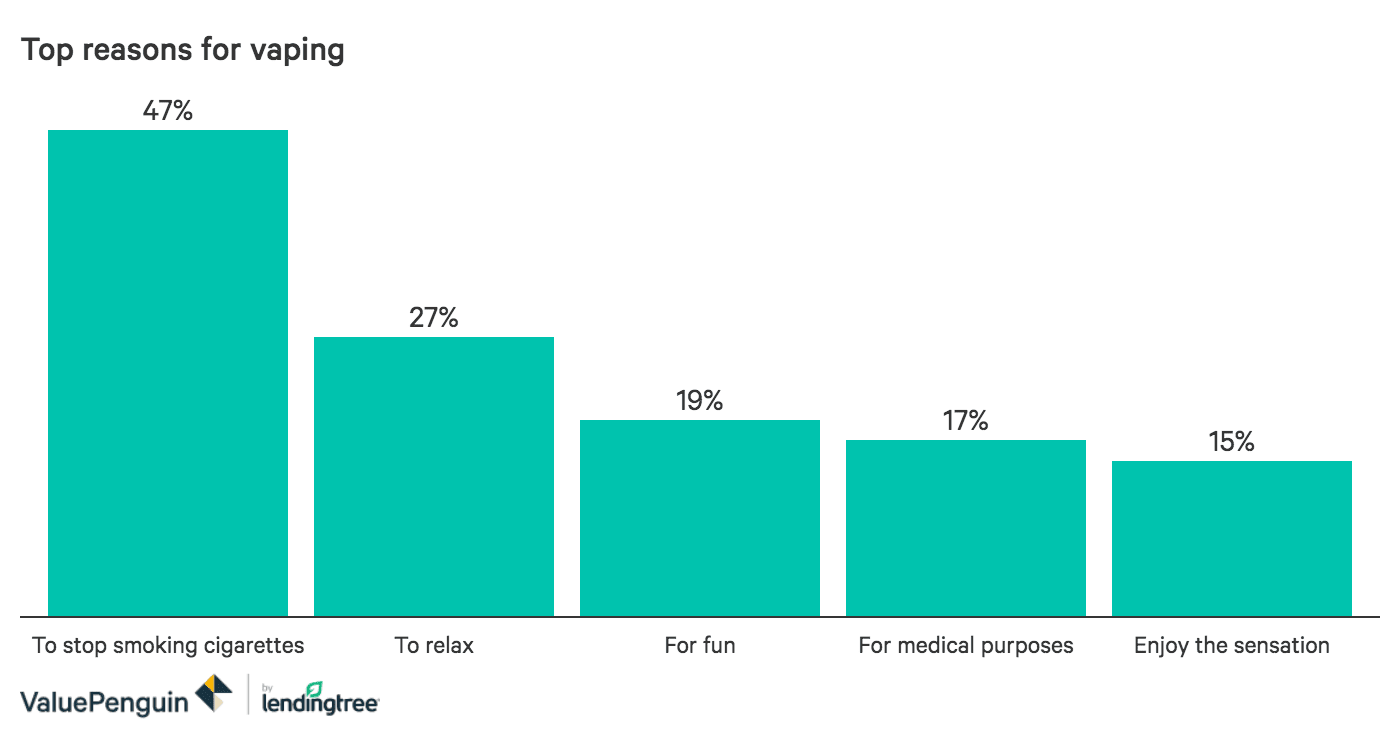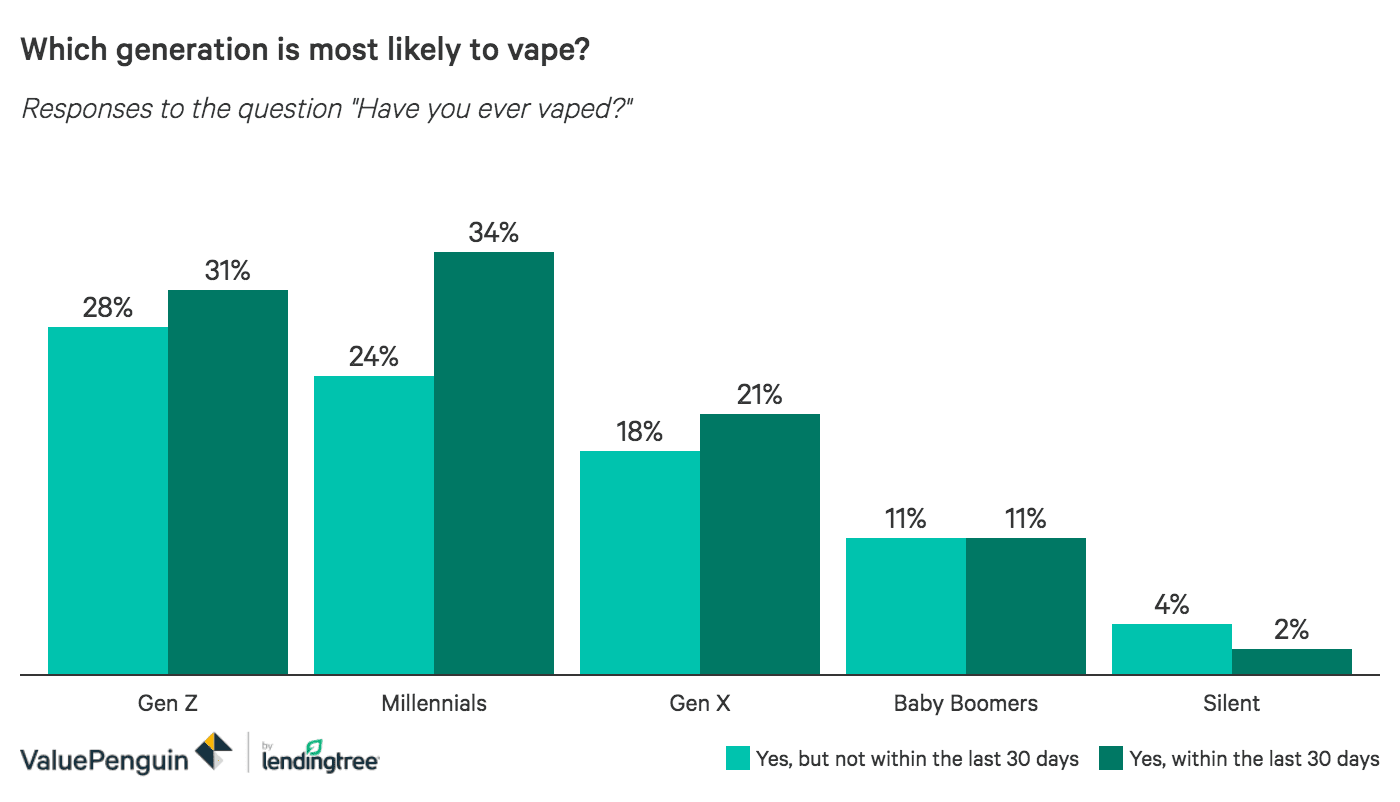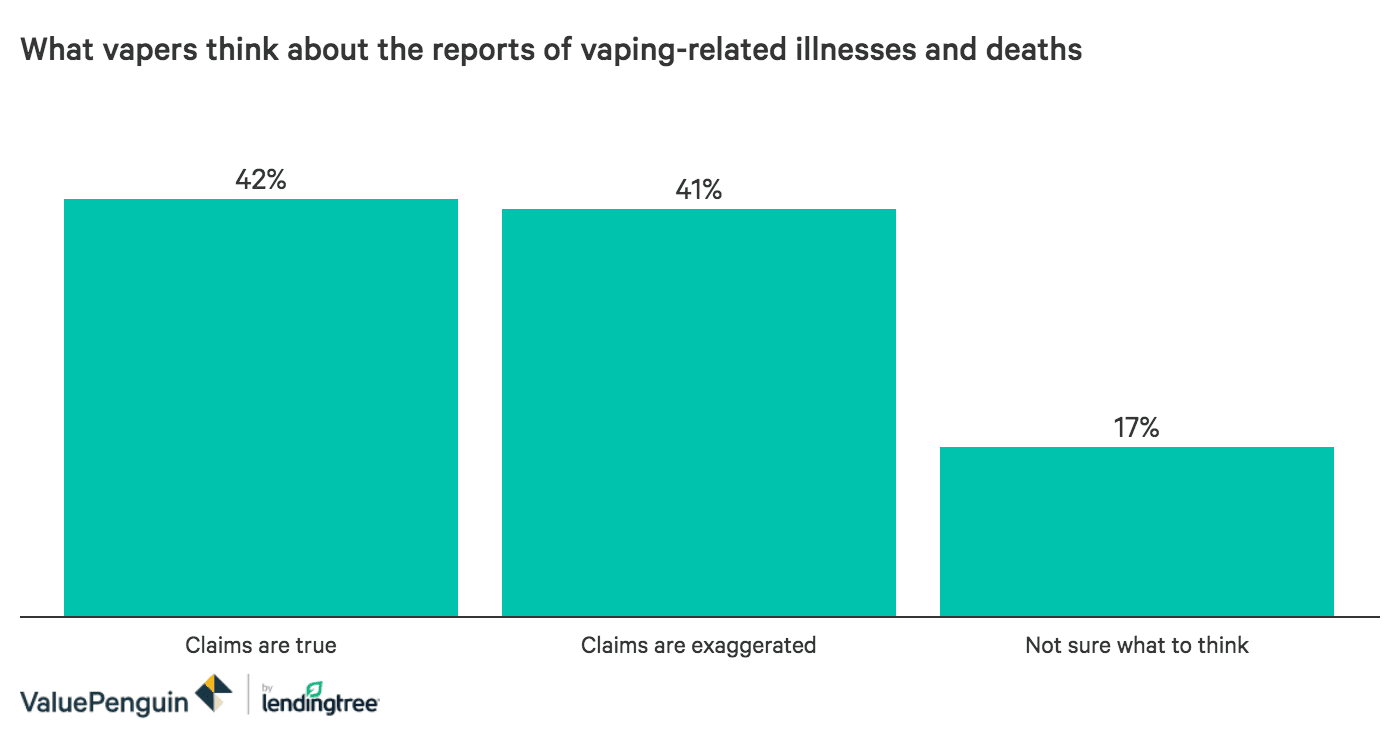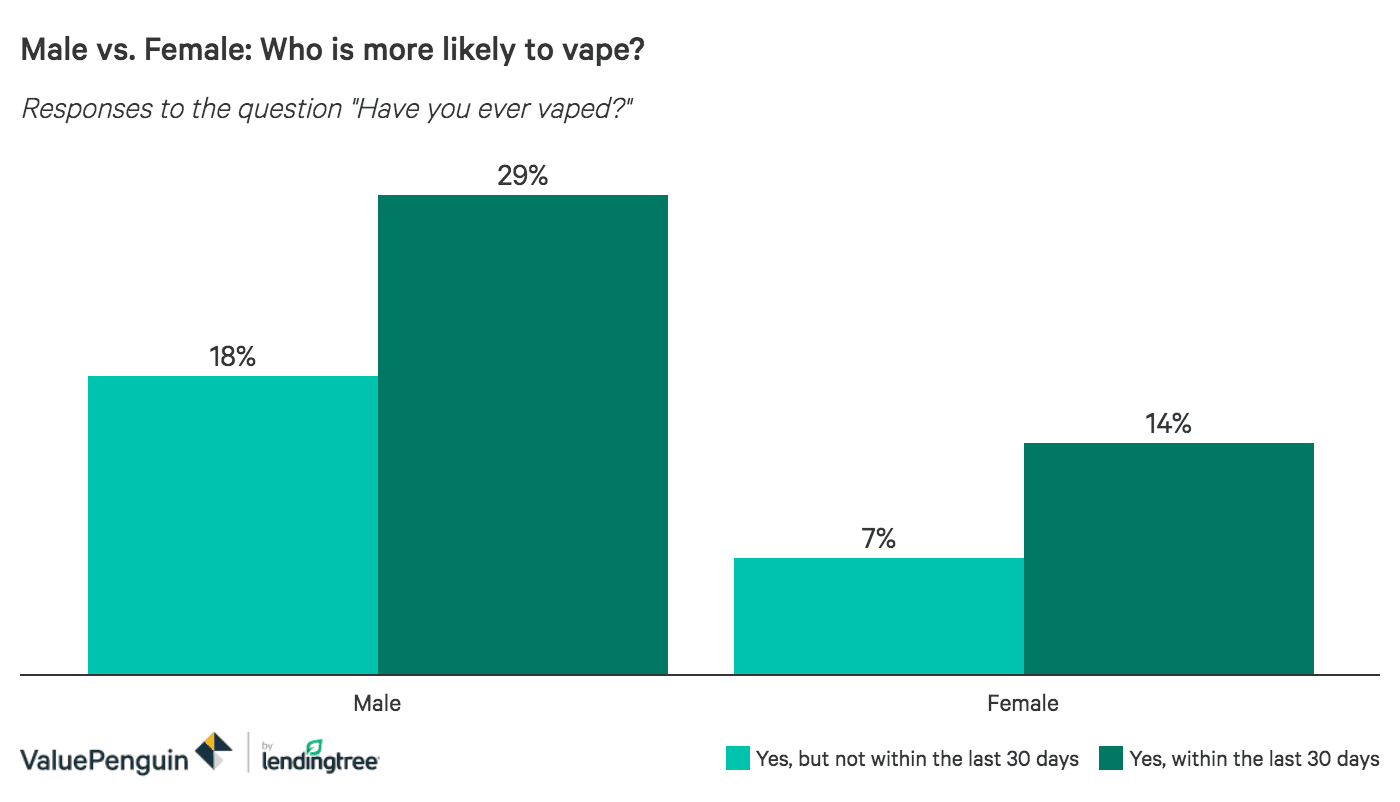Life Insurance
1 in 3 Vapers Will Continue Vaping Despite Health and Illness Risks

Key take-aways
- Roughly 1 in 10 vapers started using e-cigarettes before they turned 18, the legal age to purchase these products.
- About 2 in 5 vapers think safety concerns about vaping are exaggerated by the media.
- Men are 35% more likely to say health concerns are being exaggerated compared to their female counterparts, despite making up 70% of the victims of recent lung injuries.
- Nearly 1 in 3 vapers said they'll continue vaping despite the health risks.
- Men are twice as likely as women to feel pressured to vape in a social setting.
Why do people vape?
E-cigarettes were originally marketed as a way to help those addicted to cigarettes quit smoking. However, our survey found there are a number of reasons people choose to vape. Roughly 1 in 6 vapers say they do so for medical purposes.

Vaping has become increasingly popular, especially among people who have previously been addicted to cigarettes. About 1 in 5 respondents have reportedly vaped within the past month, and nearly 70% of this population said they've also been addicted to cigarettes in the past. The number of respondents who have vaped increases to 39% if you include those who have not done so in the last month.
Vaping frequency | Percentage of vapers |
|---|---|
| Occasional (1–20 times) | 52.8% |
| Moderate (21–50 times) | 19.7% |
| Heavy users (>50 times) | 27.5% |
With 59% of respondents reporting having vaped, Gen Z edges out millennials as the generation most likely to vape. However, considering only those who have vaped within the last month, the trend is reversed — about 33% of millennials reported vaping in the past month, compared to 31% of Gen Zers.
Furthermore, 1 in 10 vapers started using e-cigarettes before turning 18, the legal age required to purchase those products. The greatest portion of those who started vaping before age 18 was Gen Z.

A significant percentage of vapers purchase cartridges from dangerous sources. Vapers in our survey reported buying products online or from family members and other individuals. The CDC has reported that cartridges from informal sources such as these cause many vaping-related lung diseases.
Where do you purchase the cartridges for your vaping device? (multiple selections allowed) | Percentage of responses |
|---|---|
| Convenience stores | 31% |
| Online | 23% |
| Legalized recreational dispensaries | 21% |
| Medical dispensaries | 19% |
| Another person (nonfamily) | 10% |
| Family member | 6% |
| Somewhere else | 17% |
In addition to sourcing vape cartridges from informal sources, many vapers add to the danger by using vapes to consume THC. According to our survey, 46% of the vaping population say they vape with THC some of the time. The CDC has recommended that people avoid THC vaping products, as they can cause a variety of injuries.
Apart from the health concerns of vaping, many vapers who responded to our survey reported far-reaching impacts on their lives. Nearly 30% said their vaping has caused arguments in the last month. An additional 17% said they had vaping-related arguments, though not within the last 30 days. Furthermore, according to our survey, the average vaper spends $171.47 per year on vaping-related products.
Our survey found that most respondents (55%) are under the misconception that vaping will not impact their life insurance rates. Men were 27% more likely to have this misconception than women. This is somewhat surprising, given that in a previous survey, ValuePenguin found that men were more likely to own a life insurance policy than women.
How vapers feel about health concerns surrounding vaping
Awareness about the health concerns related to vaping is high, but vapers are skeptical of the actual consequences. More than 90% of respondents said they are aware of the recent reports about the illnesses and deaths linked to vaping. However, 41% say these reports have been exaggerated by the media.

The demographic that is the least concerned about the health risks of e-cigarettes make up a large portion of those with lung injuries. Recent CDC reports state that 70% of the victims of recent lung injuries are male. This is somewhat ironic, given that in our survey, men were 35% more likely to believe that health risks associated with vaping were exaggerated, compared to their female counterparts.
Although 6 in 10 who used an e-cigarette within the last month believe vaping causes health problems, 59% think the benefits outweigh the costs. Nearly 1 in 3 vapers said they'll continue doing so despite the reported illnesses and deaths. An additional 30% are trying to cut back but haven't yet, and just 39% said health concerns made them stop vaping altogether. Baby boomers who vape are most likely to say they'll continue doing so, despite reports of health concerns.
Men are more than twice as likely than women to have vaped in the past month
Nearly 3 in 10 of male respondents say they have vaped in the past month, compared to only 14% of females. A possible contributor to this discrepancy is that men are twice as likely as women to feel pressured to vape in a social setting.

Why coronavirus should make you think twice about smoking
Smoking can have negative effects on the respiratory system and deteriorate the overall health of the user. According to Johns Hopkins Medicine, COVID-19 is a respiratory disease with symptoms including cough, fever, shortness of breath, muscle aches and sore throat. This has led the World Health Organization to state that smokers and tobacco users are at a higher risk of contracting COVID-19.
Specifically, the act of smoking means that fingers are in contact with lips, increasing the possibility of transmission of the virus from hand to mouth. Furthermore, smokers may already have lung disease or reduced lung capacity, which would greatly increase the risk of severe, deadly illness.
Financial penalties of smoking and vaping
Smokers and vapers can face significant hurdles financially due to excess smoking. Life insurance companies take smoking habits into account when calculating the monthly premium for a life insurance policy. Since smoking has been proven to reduce life expectancy, life insurance providers tend to charge smokers 306% more on average when compared to a nonsmoker applicant who is the same age.
Age | Monthly life insurance cost (nonsmoker) | Monthly life insurance cost (smoker) |
|---|---|---|
| 30 years old | $26.20 | $92.14 |
| 40 years old | $38.14 | $183.87 |
| 50 years old | $91.53 | $441.69 |
| 60 years old | $245.81 | $1,076.23 |
Smoking can affect your health insurance costs. Under the Affordable Care Act, states are allowed to charge a maximum of 50% more in monthly premiums to insure smokers, compared to nonsmokers, for individual health insurance.
Methodology
ValuePenguin commissioned Qualtrics to conduct an online survey of 1,226 Americans, with the sample base proportioned to represent the general population. The survey was fielded October 15–17, 2019.
